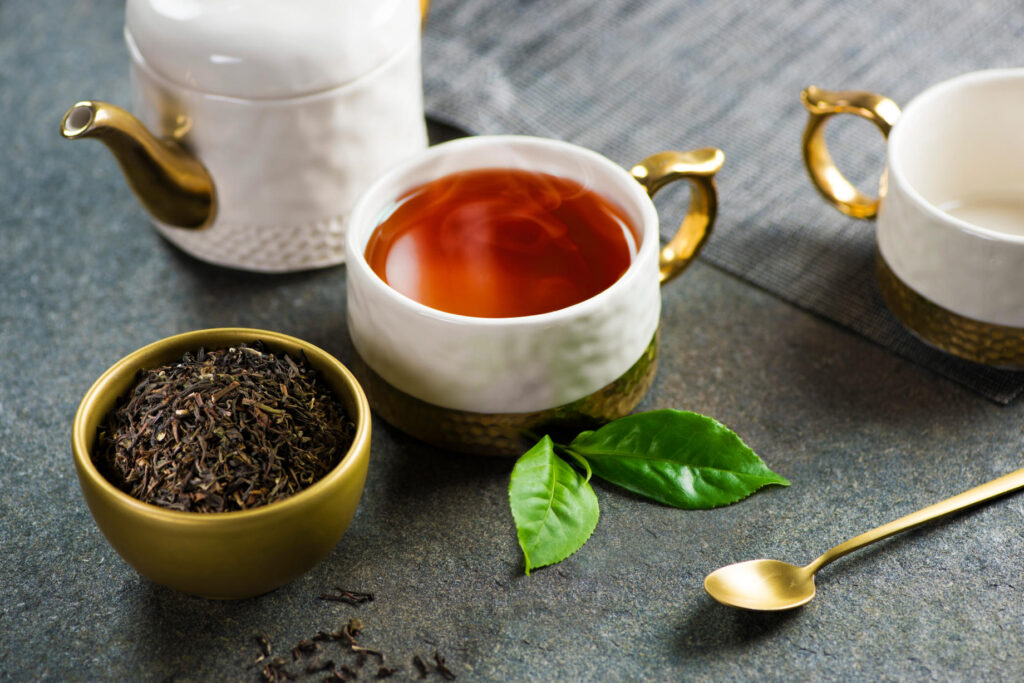Organic Remedies: Herbal Teas for Digestive Health
Digestive health is essential for overall well-being. Many people experience digestive issues such as bloating, gas, indigestion, and constipation. While there are medications available to treat these issues, some prefer natural remedies. Herbal teas are a popular choice for promoting digestive health due to their soothing and healing properties.
Understanding Digestive Health
Digestive health is crucial for the overall well-being of an individual. The digestive system plays a vital role in processing food, absorbing nutrients, and eliminating waste from the body. When the digestive system is not functioning correctly, it can lead to various health issues such as bloating, gas, indigestion, constipation, and diarrhea.
Several factors can affect digestive health, including diet, stress, hydration, exercise, and the balance of good and bad bacteria in the gut. Consuming a diet high in processed foods, sugar, and unhealthy fats can disrupt the natural balance of the digestive system and lead to issues such as inflammation and poor digestion.
Chronic stress can also have a significant impact on digestive health. Stress triggers the release of hormones that can affect the way food moves through the digestive tract, leading to symptoms such as stomach pain, cramping, and diarrhea. Additionally, inadequate hydration and lack of physical activity can slow down the digestive process and contribute to constipation.

Benefits of Herbal Teas for Digestive Health
Herbal teas have been used for centuries as natural remedies for various health issues, including digestive problems. There are several key benefits of incorporating herbal teas into your diet to promote digestive health:
- Soothing Effects: Herbal teas have calming properties that can help to soothe the digestive system and alleviate symptoms such as bloating, gas, and indigestion.
- Anti-inflammatory Properties: Many herbal teas, such as ginger and turmeric, have anti-inflammatory properties that can help reduce inflammation in the digestive tract and promote healing.
- Antioxidants: Herbal teas are rich in antioxidants, which can help to protect the digestive system from damage caused by free radicals and oxidative stress.
- Promotes Healthy Gut Flora: Some herbal teas, like dandelion and licorice root, can support the growth of beneficial bacteria in the gut, which is essential for optimal digestive health.
- Relieves Stress: Stress can have a significant impact on digestive health. Herbal teas like chamomile and lemon balm have calming effects that can help to reduce stress and improve digestion.
Types of Herbal Teas for Digestive Health
When it comes to promoting digestive health, there are several types of herbal teas that stand out for their beneficial properties. Some of the most effective herbal teas for digestive health include:
Peppermint Tea
Peppermint tea is well-known for its ability to relax the muscles in the digestive tract, which can help relieve symptoms of bloating, gas, and indigestion.
Peppermint tea is also a natural antispasmodic, meaning it can help to reduce cramping and discomfort in the stomach and intestines. Additionally, peppermint tea has a cooling effect that can soothe inflammation in the digestive tract and promote healthy digestion.
Ginger Tea
Ginger tea is a popular herbal remedy known for its powerful anti-inflammatory and antioxidant properties. When it comes to digestive health, ginger tea is highly beneficial due to its ability to improve digestion, reduce bloating, and alleviate symptoms of indigestion.
The active compounds in ginger, such as gingerol and shogaol, help to stimulate the production of digestive enzymes, which can aid in the breakdown of food and improve overall digestion. Ginger tea also has natural carminative properties, meaning it can help to reduce gas and bloating by relaxing the muscles of the digestive tract.
Additionally, ginger tea has been shown to have anti-nausea effects, making it a useful remedy for individuals suffering from nausea, vomiting, or motion sickness. Whether you experience occasional digestive discomfort or chronic digestive issues, incorporating ginger tea into your daily routine can provide soothing relief and promote better digestive health.
Chamomile Tea
Chamomile tea is well-known for its calming and relaxing properties, making it an excellent herbal remedy for stress-related digestive issues. Chamomile tea can help to relax the muscles of the digestive tract, reduce inflammation, and alleviate symptoms such as bloating, gas, and indigestion.
The active compounds in chamomile, such as flavonoids and terpenoids, have anti-inflammatory effects that can help to soothe irritated digestive tissues and promote healing. Chamomile tea also acts as a mild sedative, making it a popular choice for individuals who struggle with anxiety and stress-related digestive issues.
Whether you suffer from occasional digestive discomfort or chronic digestive issues, incorporating chamomile tea into your daily routine can provide relief and support your digestive health. Enjoying a warm cup of chamomile tea before bedtime can help to relax your mind and body, promoting better digestion and a peaceful night’s sleep.

Dandelion Tea
Dandelion tea is a unique herbal remedy that is specifically beneficial for promoting liver health and supporting digestion. The dandelion plant is rich in vitamins, minerals, and antioxidants that can help to detoxify the liver, improve bile flow, and enhance overall digestion.
Drinking dandelion tea can help stimulate the production of bile, a digestive enzyme produced by the liver that aids in the breakdown of fats and the absorption of nutrients. Improved bile flow can support better digestion and help alleviate symptoms such as bloating, gas, and constipation.
In addition to its digestive benefits, dandelion tea is also known for its diuretic properties, meaning it can help promote detoxification and eliminate excess fluids and waste from the body. Whether you’re looking to support your liver health or improve your digestion, incorporating dandelion tea into your daily routine can be a natural and effective way to boost your overall well-being.
Licorice Tea
Licorice tea is a herbal remedy that has been used for centuries in traditional medicine for its numerous health benefits, particularly for digestive health. Licorice root contains compounds that have anti-inflammatory, antioxidant, and soothing properties that can help support the digestive system.
Licorice tea is known to help with various digestive issues, such as indigestion, heartburn, bloating, and stomach ulcers. It can help reduce inflammation in the digestive tract, calm irritation, and promote the healing of the digestive lining. Licorice tea is also beneficial for maintaining a healthy balance of gut flora by promoting the growth of beneficial bacteria.
It is important to note that licorice tea should be consumed in moderation as excessive intake may lead to side effects such as high blood pressure and potassium loss. Consulting with a healthcare provider before regularly consuming licorice tea is recommended, especially for individuals with existing health conditions.
Fennel Tea
Fennel tea is a popular herbal remedy used for its digestive benefits and soothing properties. Fennel seeds contain compounds that can help to relax the muscles of the digestive tract, reduce gas and bloating, and alleviate symptoms of indigestion and stomach cramps.
Fennel tea is also known for its carminative properties, meaning it can help to expel gas from the digestive system and relieve discomfort. It can help to improve digestion by stimulating the production of digestive enzymes and promoting the absorption of nutrients.
In addition to its digestive benefits, fennel tea is also rich in antioxidants, vitamins, and minerals that can support overall health and well-being. Whether you’re looking to alleviate digestive issues or simply enjoy a soothing and flavorful herbal tea, fennel tea is a great choice to incorporate into your daily routine.
Lemon Balm Tea
Lemon balm tea is a refreshing and calming herbal remedy that offers numerous health benefits, including support for digestive health. Lemon balm contains compounds that have anti-inflammatory and antispasmodic properties, making it effective in relieving digestive issues such as indigestion, bloating, and stomach cramps.
Lemon balm tea can help to relax the muscles of the digestive tract, reduce inflammation, and soothe irritation in the stomach and intestines. It is also known for its calming effects on the nervous system, making it a great choice for individuals experiencing stress-related digestive issues.
Cinnamon Tea
Cinnamon tea is a delicious and aromatic herbal tea that offers a range of health benefits, including support for digestive health. Cinnamon contains compounds that have anti-inflammatory, antioxidant, and antimicrobial properties, making it a valuable remedy for various digestive issues.
Cinnamon tea can help to improve digestion, reduce bloating, and alleviate symptoms of indigestion and gas. It can also help to regulate blood sugar levels and support overall metabolic function, which can have a positive impact on digestion and gut health.
In addition to its digestive benefits, cinnamon tea is rich in nutrients such as manganese, calcium, and fiber, making it a nutritious and flavorful addition to your daily wellness routine. Whether enjoyed on its own or combined with other herbal teas for added benefits, cinnamon tea is a versatile and beneficial choice for supporting digestive health and overall well-being.
How to Brew Herbal Teas for Digestive Health
Brewing herbal teas for digestive health is a simple and straightforward process that can be easily incorporated into your daily routine. Here are some general guidelines to help you brew herbal teas effectively for optimal digestive health benefits:
- Select High-Quality Herbs: Choose organic, high-quality herbs and ingredients for the best flavor and therapeutic benefits.
- Use Filtered Water: Use filtered or purified water to brew your herbal teas to avoid any contaminants that may affect the taste or quality of the tea.
- Proper Steeping Time: Follow the recommended steeping time for each herbal tea, as prolonged steeping can result in a bitter taste or too strong of a flavor.
- Optimal Temperature: Different herbs require different brewing temperatures, so be sure to check the specific temperature recommendations for each herbal tea.
- Cover While Steeping: Covering your tea while it steeps can help retain the essential oils and flavors of the herbs, ensuring a more aromatic and flavorful brew.
- Strain Before Serving: Strain your herbal tea before serving to remove any loose herbs or particles, resulting in a smoother and more enjoyable drinking experience.
By following these simple steps, you can brew herbal teas effectively and enjoy the full benefits of their therapeutic properties for digestive health and overall well-being.

Tips for Incorporating Herbal Teas into Your Diet
Incorporating herbal teas into your diet can be a pleasant and effective way to support digestive health and overall wellness. Here are some tips for incorporating herbal teas into your daily routine:
- Choose a Variety: Experiment with different herbal teas to discover your favorites and benefit from a range of flavors and health benefits.
- Drink Regularly: Make it a habit to enjoy herbal teas throughout the day, whether with meals or between meals, to support your digestive system consistently.
- Consider Timing: Some herbal teas, such as chamomile or peppermint, are particularly beneficial before or after meals to aid digestion and alleviate digestive discomfort.
- Stay Hydrated: Herbal teas can contribute to your daily hydration needs, so be sure to drink plenty of water in addition to herbal teas to support overall health.
- Add Flavor: Customize your herbal teas with natural sweeteners like honey or stevia, or add citrus slices, herbs, or spices for extra flavor and health benefits.
- Include in a Wellness Routine: Incorporate herbal teas into your daily wellness routine, whether as a calming bedtime ritual or a midday pick-me-up for digestive support.
Conclusion
In conclusion, herbal teas offer a natural and gentle approach to promoting digestive health. With their diverse array of therapeutic properties, including anti-inflammatory, antioxidant, and soothing effects, herbal teas can help alleviate digestive discomfort, reduce bloating, improve digestion, and support overall gut health. By incorporating a variety of herbal teas into your daily routine, you can enjoy the calming and healing benefits they provide, leading to a happier and healthier digestive system.
Whether you prefer ginger tea for its digestive enzyme-stimulating properties, chamomile tea for its stress-relieving effects, or cinnamon tea for its anti-inflammatory benefits, there is a herbal tea option to suit your needs and preferences. Embrace the power of herbal teas as a natural remedy for digestive health and discover the wonderful benefits they can offer to support your overall well-being.
Also Read:
The Ultimate Guide to Glowing Skin: Tips and Tricks



